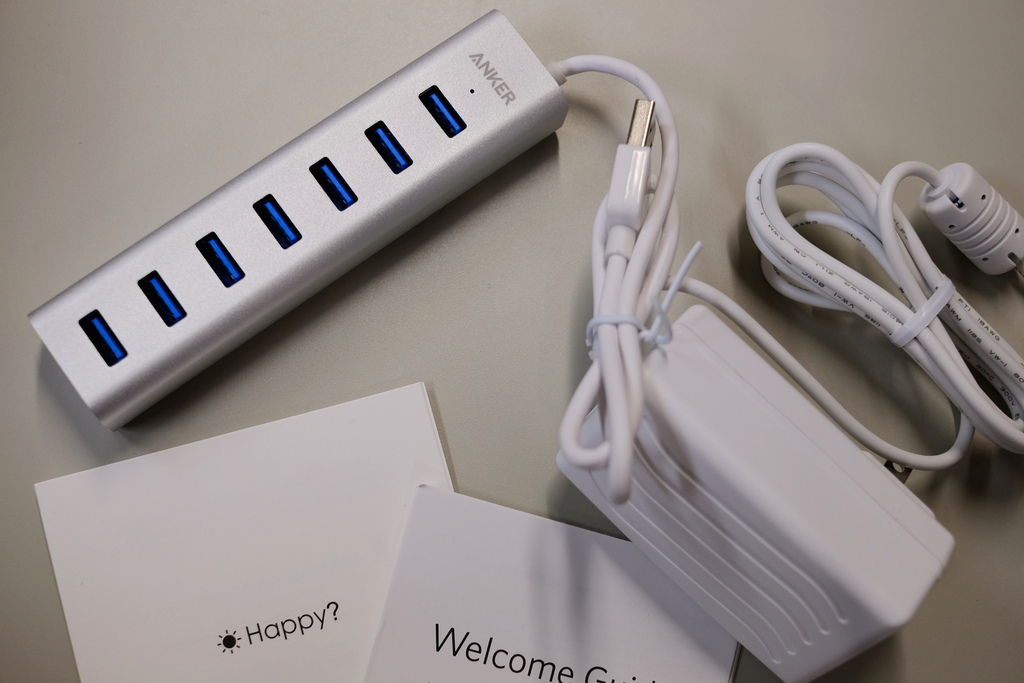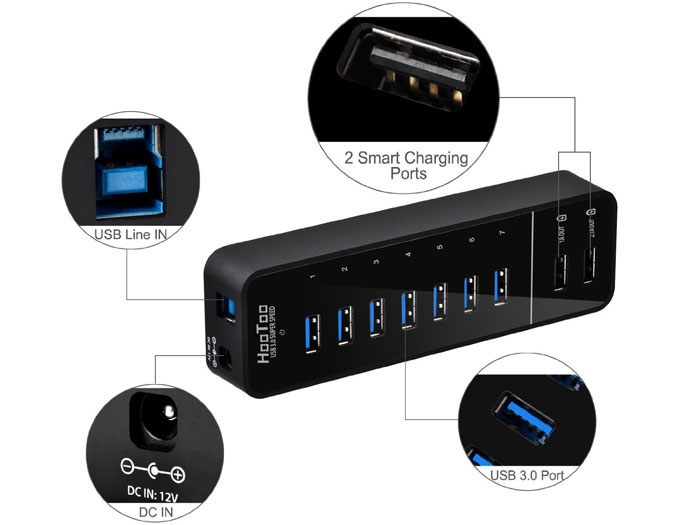
Anker USB 3.0 7-Port
USB 3.0 Hub For Audio
Buy from Amazon $35.99We receive a small kickback from our partners when you click through and purchase the great gear we recommend. Details
Best USB Hub For Audio
Anker USB 3.0 7-Port
- Don Makoviney
- Last Updated: September 5, 2020
If I was in the market for a new one, I'd get the Anker® Unibody USB 3.0 7-Port Hub. It is USB 3.0, backwards compatible to USB 2.0 (which is important), and even has a USB 1.2 port. It can be used with the included power adapter, but can also be powered by the USB hub when needed for portability. Even with all those features, it's reasonably priced.
Table Of Contents
- What Makes A Great USB Hub For Audio Production?
- The Best USB Hub
- How We Picked
- Best Portable USB Hubs
- Other Picks
What Makes A Great USB Hub For Audio Production?
Finding quality USB hubs can be a tricky endeavor. On Amazon, you’ll find a dizzying array of choices. To make matters worse, many manufacturers are vague about their hub capabilities, which can cause problems and cost you valuable time you could be using to work on your music.
Well be looking at USB hubs that are powered, which means our pick will have an AC adapter to power various items, which could include anything from MIDI Controllers, instruments, external hard drives, and flash drives.
Music gear manufacturer Alesis says on their website:
“If you use a USB hub to connect your device, use a hub that has its own AC power adapter. If necessary, upgrade to a premium USB cable. If you are in an area that has a high level of radio or electrical interference, and you experience noise or hum when using USB audio, upgrade your USB cable to a premium cable with extra shielding and a ferrite bead (a cylindrical bump on one end of the cable), which can filter out some external noise.”
 One of the biggest growth areas for reliable USB hubs is DJs. According to David Schulman at DJ Tech Tools, their requirements are very similar:
One of the biggest growth areas for reliable USB hubs is DJs. According to David Schulman at DJ Tech Tools, their requirements are very similar:
“What Makes A Quality Studio Hub: If your computer features USB 3.0, getting the most up-to-date hardware will save you money down the road. Make sure your prospective hub also includes the necessary AC adaptor to power it – and that all of the ports are fully powered (some cheap hubs only power certain ports). Also note: Buy PCIe for desktops – a PCIe card will solve both power and data transfer issues but needs a PCIe motherboard slot to work. This is really important if hard drives are sharing a hub. Check all the ports – some hubs will offer combinations of USB 3.0 and 2.0 ports. Double check you’re getting what you want before buying Spend now to save later – The newest USB 3.0 hubs will run you a bit more money (around $60) but you’ll save having to buy a new hub in a year or two.”
The current standard for USB is called ‘USB 3.0’. However, you or other musicians might have USB 2.0, or even USB 1.2 devices. For this reason, the USB hub should also be backwards compatible with at least USB 2.0.
How many USB ports do you need? Well, we want to strike a balance between having enough USB ports to accomodate all our devices, yet not have so many USB ports that we’d never use them. So, for studio and home studio use we’ll be looking for something between 5-10 USB ports. If you need more or less USB ports, just move up or down the scale from there. Many of the models we recommend below have the same configuration with several different options for numbers of ports.
For instance, one of our favorites, the Anker has everything from 4-port, 7-port, even 13-port options. The reviews don’t lie – pick any one of these Anker USB Hubs and you’ll be just fine.
Which brings us to our pick:
The Best USB Hub
The Anker® USB 3.0 7-Port Hub is the one we’d get. 7 ports is plenty, the AC adapter produces enough power to handle several devices requiring power. It is also backwards compatible all the way back to USB 1.2. The 7-port
In addition to the included power adapter, the Anker can also be powered by your computer’s onboard USB bus power. This means you don’t need the power adapter if you’re just plugging in flash drives, maybe a keyboard and mouse, and eve some smaller MIDI or audio controllers which may not need a lot of power.
Of course, as mentioned earlier, should you need more ports Anker also makes a 10-port and 13-port option. They also make a 5-port option, so pretty much all you need to do is figure out how many ports you need and then choose appropriately.
How We Picked (aka: my mistakes are your gain)
Again, from DJ Tech Tools:
One of the challenges with finding the right hub lies in the fact that there are so many options. USB has gone through many upgrades and changes since it first became available and many hubs can be deceiving in how up-to-date their hardware is.
Agreed. As a computer programmer for over a decade, with a home recording studio – to say I have had experience with USB hubs is a massive understatement. I’ve been burned many times, purchasing USB hubs without reading the fine print, only to find out when I set it up it doesn’t have as many USB 3.0 ports as I thought, or super slow transfer speeds, and generally cheaply made hubs that ended up not lasting long at all.
So, user reviews are important. All our recommended hubs have hundreds of reviews attesting to their reliability.
Conclusion
Shopping for USB hubs can be a confusing experience, so going with the ones we’ve recommended here will get you in the ballpark. Just move up or down depending on how many ports you need and you’ll save a lot of time you would have spent messing with an unreliable USB hub.
Instead, use that time to get some more music recorded!
Happy playing!
Tell Me If There's A Deal For This
Best USB Hub For Audio
Anker USB 3.0 7-Port

Important Specs
| Dimensions | 5 x 1.2 x 0.8 inches |
| Weight | 2.6 ounces |
| Power Adapter | 5V / 3A, w built-in 5ft cable |
| Accessories | 1.3ft USB 3.0 cable |
| Extras | Built-in surge protection |
| Warranty | 18 mos. |
| more specs |
Synopsis:
If I was in the market for a new one, I'd get the Anker® Unibody USB 3.0 7-Port Hub. It is USB 3.0, backwards compatible to USB 2.0 (which is important), and even has a USB 1.2 port. It can be used with the included power adapter, but can also be powered by the USB hub when needed for portability. Even with all those features, it's reasonably priced.

The Overkill
Manhattan 28-port USB Hub
You don't want this USB hub. I posted it here because - WHAT?! - it's ginormous! It does have a few USB 3.0 ports on the sides. But the majority of the USB ports are 2.0. Pass on this.

Great, with extras
HooToo HT-UH010 7-Port USB Hub
Compact, reliable, and plenty of ports make this a great choice. There's some extra ports specially for charging iPads, which isn't a necessity for audio production, but may be something you could use. If so, get this one.
Sources
-
Staff, Alesis.com, 20081101
Tips and tricks for music and computers“If you use a USB hub to connect your device, use a hub that has its own AC power adapter. If necessary, upgrade to a premium USB cable. If you are in an area that has a high level of radio or electrical interference, and you experience noise or hum when using USB audio, upgrade your USB cable to a premium cable with extra shielding and a ferrite bead (a cylindrical bump on one end of the cable), which can filter out some external noise.”
-
Jeremy, Audio Bus, 20140701
The best usb hub“I use the Belkin 4 and 7 port USB sticks with no issues. Lots of controllers. Just be sure to put your audio interface on the hub closest to the iPad CCK if you are chaining hubs for more ports.”
-
djjc.techgrooves, Native Instruments, 20140322
Best usb hub“I use a Belkin USB 2.0 4-Port Swivel Hub. Comes with a power adapter so works either from your USB port's power alone (enough for my 2 midi controllers), or can be plugged in to run more power hungry devices. It's small, well made and gives 4 ports from 1 of your computer's. Cheap too!”
-
DJ Vintage, Digital DJ Tips, 20140206
MacBook Pro powered usb hub help?“Long story short, you can get a USB 2.0 powered hub, but you’d have to check the supplied power adapter can deliver 0,5A per port. Brand should not play a part. It’s really as simple as how much power do you need and how much can the hub supply. Normally with stuff like mice, memory sticks and even some external HDD’s it’s relatively low, but when you start hooking up stuff like full blown controllers and Maschine it soon starts to add up and there is just not enough power available.”
-
unrelatednotes, Gearslutz.com, 20140514
USB Hubs“This setup works great for me with no noticeable latency. I attach my soundcard directly to the computer via a dedicated USB port. Attaching a soundcard to a hub introduces significant latency on my system.”
-
David Schulman, DJ Tech Tools, 20130902
USB Hubs for Studio and Mobile DJs“What Makes A Quality Studio Hub: Going for something self-powered here is a no-brainer. If your computer features USB 3.0, getting the most up-to-date hardware will save you money down the road. Make sure your prospective hub also includes the necessary AC adaptor to power it – and that all of the ports are fully powered (some cheap hubs only power certain ports). Also note: Buy PCIe for desktops – a PCIe card will solve both power and data transfer issues but needs a PCIe motherboard slot to work. This is really important if hard drives are sharing a hub. Check all the ports – some hubs will offer combinations of USB 3.0 and 2.0 ports. Double check you’re getting what you want before buying Spend now to save later – The newest USB 3.0 hubs will run you a bit more money (around $60) but you’ll save having to buy a new hub in a year or two.”
Important Specs
| Dimensions | 5 x 1.2 x 0.8 inches |
| Weight | 2.6 ounces |
| Power Adapter | 5V / 3A, w built-in 5ft cable |
| Accessories | 1.3ft USB 3.0 cable |
| Extras | Built-in surge protection |
| Warranty | 18 mos. |
| more specs |
Follow MSCGR
Talk To Us
Did we miss a recommendation? Is there something you'd like to see us review? Typos? Mistakes? If so, drop us a line.
